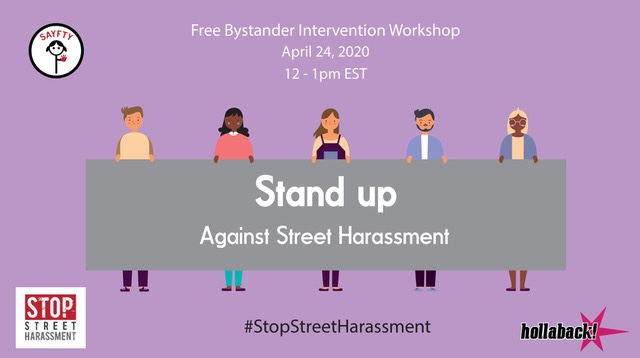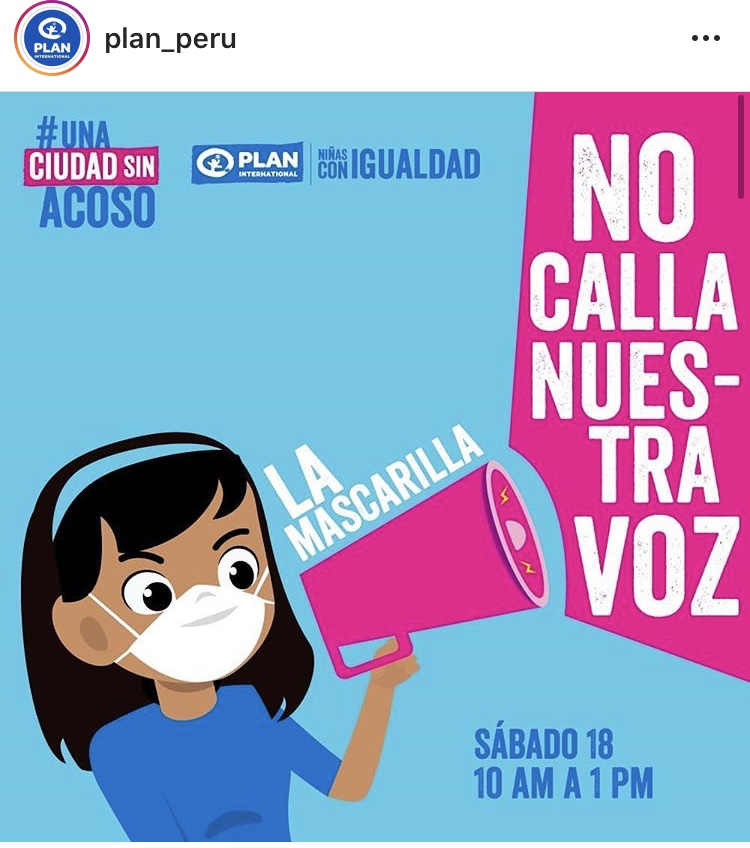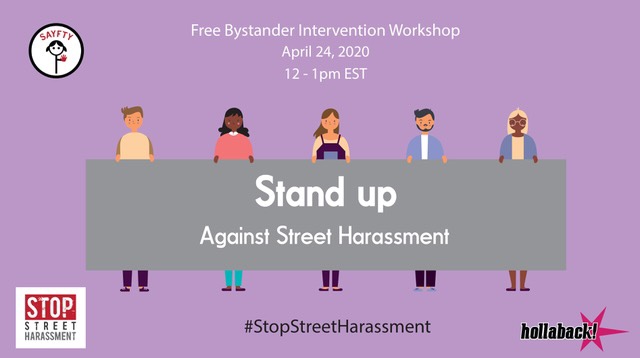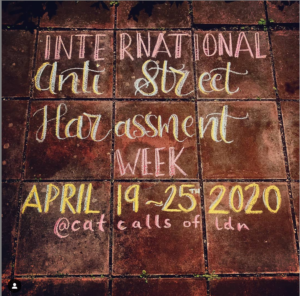 Today marks the first day of International Anti-Street Harassment Week, and it’s our 10th year of organizing global action.
Today marks the first day of International Anti-Street Harassment Week, and it’s our 10th year of organizing global action.
Even though most places around the world are under stay-at-home orders to combat the coronavirus COVID-19, it does not mean that street harassment has completely stopped. So, even now, our efforts to raise awareness and call for its end remain relevant. It also means now is the time to plan for a better future.
Here’s information on each topic, as well as a preview of some of the virtual actions for the week that you can join.
COVID-19 Stories
Eliza who runs Cheer Up Luv in the UK posted about street harassment on her Instagram account and gave me permission to post it on our blog here. In part she wrote, “For some, it seems the new restrictions are giving a freedom to harassers to do whatever they please, and not face the repercussions of their actions.”
Everyday Sexism Founder Laura Bates said they received an increase in street harassment during quarantine stories globally recently and wrote about it for the Telegraph.
“‘We are literally in the midst of a global pandemic and I just got catcalled TWICE while enjoying my one allotted trip out of the house today. Priorities people.’
Unbelievably, this was just one of many comments recently sent in to my Everyday Sexism Project, which collects testimonies of gender inequality… even during a pandemic lockdown, the reports have not stopped.”
In Argentina, Acción Respeto: por una calle libre de acoso began receiving stories and are currently collecting more this week. One story read:
“Malas experiencias las pocas veces que sali, como no hay nadie en la calle, la hacen peor y se te matan de la risa. Siento mucho mas miedo. Fui hasta un cajero y me cruce con un tipo que me seguia con la mirada y se daba vuelta a ver que hacia. O van de a dos caminando ( cosa que no se puede) y se te rien porque ellos van siempre en ventaja.”
(English approx translation via Google: “Bad experiences the few times I went out, as there is nobody on the street, they make it worse and they kill you laughing. I feel much more afraid. I went to an ATM and came across a guy who was following me with his eyes and turned to see what he was doing. Or they go two by two (which is not possible) and they laugh at you because they are always ahead.”)
It is unfortunate that street harassers still feel emboldened to harass, harm and scare people during what should be a time of global solidarity as we work to contain the virus and keep everyone healthy and safe.
Plan for a Better Future + Educational Information
One of the most effective ways to combat sexual harassment, including street harassment, is for witnesses to it to stand up and speak out when they are safe and able to do so. This can help make street harassment socially unacceptable and reduce the number of future incidents.
This week, Sayfty and Hollaback! are teaming up to offer two important virtual offerings on the topic.
April 20: Sayftychat will take place with Sayfty and Hollaback! on Twitter at 3:30 pm UTC/11:30 am EST, “Bystander Intervention During This Pandemic.” Use #SayftyChat
April 24: There will be a free virtual Zoom training on standing up to harassers offered on April 24, 4pm UTC/12pm EST in English. You must pre-register. Organized by Hollaback! and Sayfty.
You can also find information on our website about bystander intervention and responding to street harassers in the moment and later.
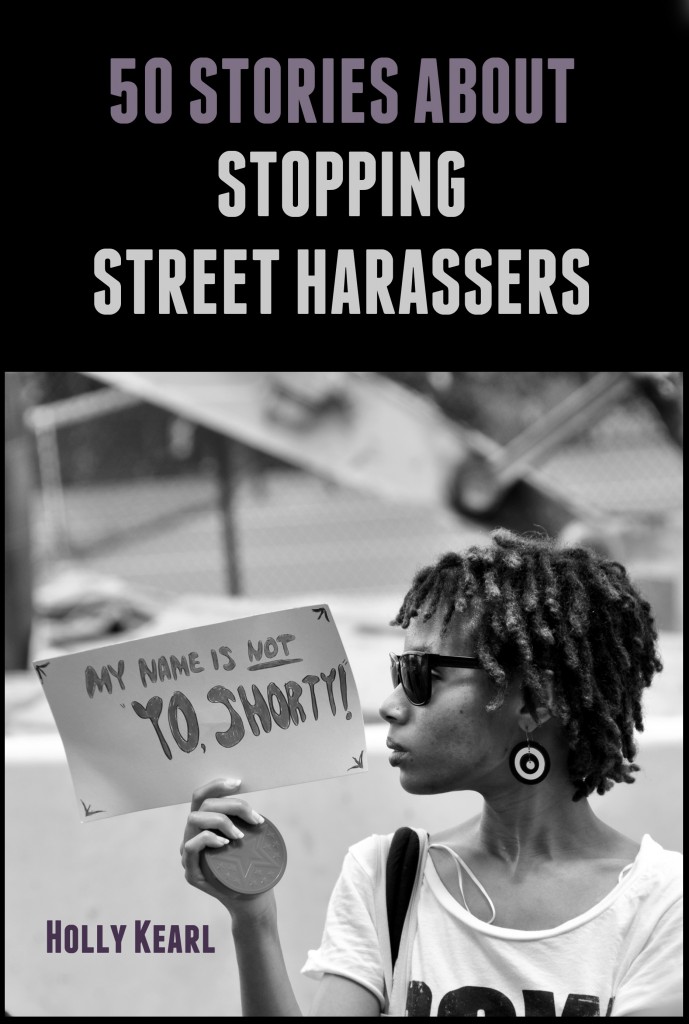 And we have books with information on responding to harassers in our books, such at 50 Stories About Stopping Street Harassers. One reader of this book said, “”
And we have books with information on responding to harassers in our books, such at 50 Stories About Stopping Street Harassers. One reader of this book said, “”
To learn more about street harassment overall, check out our book Stop Street Harassment: Making Public Places Safe and Welcoming for Women and learn about the global campaigns that have helped shape the current movement to stop it in the sequel Stop Global Street Harassment: Growing Activism Around the World.
You can also learn about street harassment in the U.S. in our national study on street harassment, which also has a section on solutions.
Creative Awareness-Raising Efforts
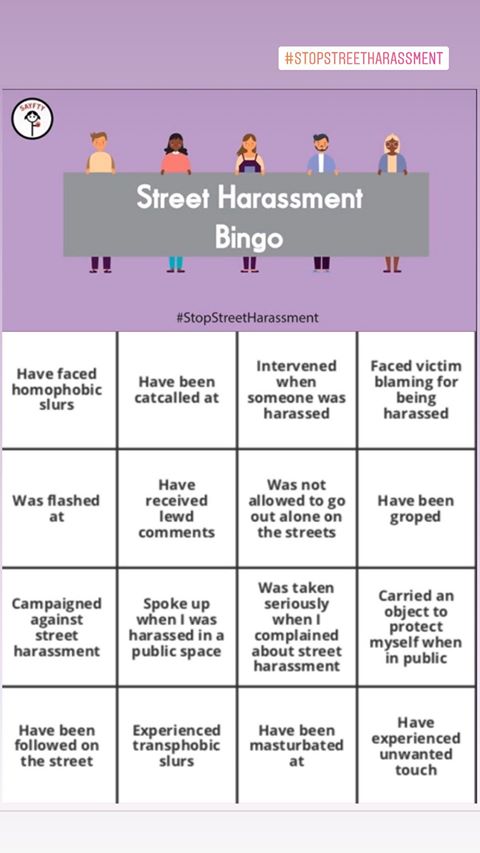 Across this Week, you will find many virtual creative awareness-raising efforts, from videos in which people describe what they would do if there was no street harassment, to street harassment bingo, to sharing messages/stories about street harassment in photos, to discussion groups about TV episodes that contain street harassment situations.
Across this Week, you will find many virtual creative awareness-raising efforts, from videos in which people describe what they would do if there was no street harassment, to street harassment bingo, to sharing messages/stories about street harassment in photos, to discussion groups about TV episodes that contain street harassment situations.
Here is a photo album with highlights.
You can join the Global Day of Online Action on 21 April and share street harassment stories, facts, and activism ideas across the day. Use #StopStreetHarassment.
There will also be a few tweet chats across the week, with a schedule listed below.
April 20: @IBVMNGO and @pinthecreep will host a tweet chat on “Street harassment from a youth perspective” at 12 p.m. UTC/8 a.m. EST and 5:30 p.m. IST. Use #StopStreetHarassment
April 20: Sayftychat will take place with Sayfty and Hollaback! on Twitter at 3:30 pm UTC/11:30 am EST, “Bystander Intervention During This Pandemic.” Use #SayftyChat
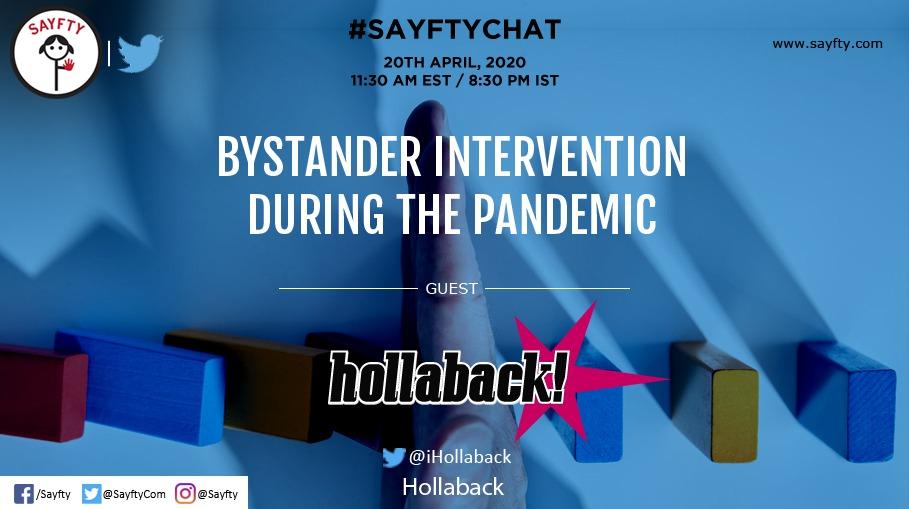
April 21: @CatcallsofNYC and @PintheCreep are hosting a tweet chat on “Street harassment and responding in real time” at 12 p.m. UTC/8 a.m. EST and 5:30 p.m. IST. Use #StopStreetHarassment
April 21: Paremos el Acoso Callejero is holding a tweet chat en Espanol, 3-5p.m. Use #SinAcosoYo
April 22: @IGHomelessness and @PintheCreep will host a tweet chat on “Street harassment and homelessness” at 12 p.m. UTC/8 a.m. EST and 5:30 p.m. IST. Use #StopStreetHarassment
April 24: @NGOsonFfD and @PintheCreep will host a tweet chat on “The role of financing – Ensuring safe, inclusive streets for all” at 12 p.m. UTC/8 a.m. EST and 5:30 p.m. IST. Use #StopStreetHarassment
We are grateful to our partners Safecity/Red Dot Foundation and Catcalls of NYC for overseeing many of these efforts.
Please plan on joining us this week in whatever capacity you can! Now is the time to work to stop street harassment.
